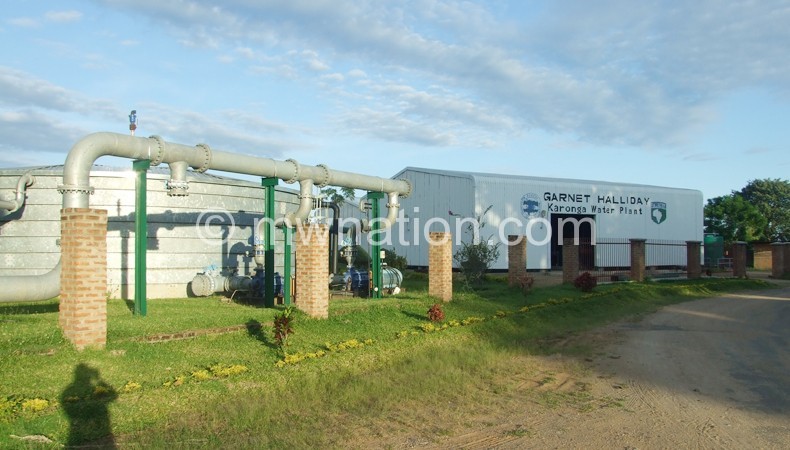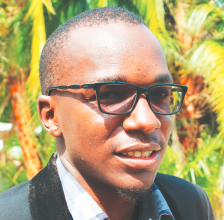Water situation in karonga, ultramodern water plant
In this series, Mzuzu bureau supervisor James Chavula continues to look at the potable water problems in Karonga and on measures being implemented to change the status quo.
In their minds, the experts saw it fit for the water supply plant to be planted at a bay adjacent to Karonga Central legislator Frank Mwenefumbo’s Mikoma Beach Lodge where the impact of the storms is usually suppressed.

Weekend Nation toured the recommended site between Mwenelondo and Mlare. The locals say shifting the water supply plant to town deny them a once-in-a-lifetime opportunity to have tap water within reach.
From the rejected source, the machine erected by Paladin Africa was envisaged to pump water into storage tanks in a neighbouring hill, a geographical advantage which would have seen the Northern Region Water Board (NRWB) forgo high cost of electricity by distributing water using gravity.
The documents also shows that if Paladin had obliged to install the pumps in the area, the water supply plant would not have suffered the avoidable catastrophe of 2010 when its intake was filled with sand after being blown ashore by devastating winds.
“The NRWB has experienced some difficulties with the plant’s water intake system due to the severe conditions on Lake Malawi,” Paladin makes the foreseen admission on its website having bypassed local engineers’ proposal counsel in preference for expatriates.
Counting the losses, the harsh winds made Paladin (Africa) Limited to hire a South African marine engineer to review the intake system and recommend modifications in a desperate effort to secure a long-lasting solution.
An extra cost, maintenance works delayed the completion of the project credit to improve the reliability of the water supply to Karonga.
In Paladin’s own terms, this entailed repositioning, re-laying and anchoring a total of 760m of pipeline on the lakebed, complete with a redesigned intake strainer system.
“Mota-Engil precast 92 concrete blocks to weight the pipeline. This involved weights of 2.5 tonnes per nine metres of pipe – which is three times the required anchoring weight for this type of pipeline,” the website reads.
NRWB public relations manager Edward Nyirenda says the Karonga water plant, constructed as part of its undertaking under the Development Agreement, has experienced significantly improved pumping efficiency since the completion of this work.
While refusing to comment on the long-awaited Songwe-Lwezga inroads, Nyirenda commended Paladin for installing the “ultramodern water plant in Karonga, the only one of its kind in the country”.
He said it is no ordinary not only because it absorbs and produces about 500 cubic metres of water per hour but also because the water is purified using a filter membrane system “meaning it can be bottled straightaway”.
In an interview, the publicist said: “Prior to this, we were using boreholes which could hardly pump enough water into reservoirs for the ever-increasing population. From there, the water had to be filtered using special sand from Chilumba. With the new plant, we have moved to a more secure water body, Lake Malawi, with tasty water which have lower levels of iron and salts than the ground water from the boreholes.”
This is supposed to be good news, but the downside is that the people of Karonga have a modern water supply plant with the same old small pipe system for distributing the gushes it produces. The main losers are people in rural localities.
“In the wake of the new developments, we have to upgrade the pipe system from the tanks to the customers. Unfortunately, the distribution system has not grown,” confirmed Nyirenda.
This means that the mighty Garnet Halliday machines can only serve water to the existing connections. Projections from the 2008 census show Karonga has about 280 000 people, but only 5 000 were connected to the NRWB system.
Ministry of Water Development and Irrigation public relations officer James Kumwenda said the decision to plant the water supply point at Karonga Boma involved the Ministry of Finance that signed the agreement with Paladin on behalf of government as to “whether the social responsibility should be rural water supply or town water supply”.
“The ministry only provided technical direction and services during the construction of the water supply system as it does with all water boards when it comes to construction of water supply systems,” he said.
Kumwenda, however, said there are several initiatives by both government and its development partners to improve water supply in the district.
“For example, through the National Water Development Programme, the ministry is rehabilitating and expanding Lufilya Gravity Water Supply Scheme, which will supply water in the two traditional authorities of Kyungu and Kilupula. Apart from this, there are also other partners who are working together with government to provide water points across the district and these include Unicef, World Vision and Red Cross,” he said.
As usual, the majority of the unmet demand is in the rural areas. In 2011, Unicef and WHO found out that while only six in 100 urban dwellers have no access to piped water, nearly 19 in remote areas are have-nots.
But Kumwenda says according to the Welfare Monitoring Survey 2011, 95.3 percent of the population in Karonga has access to potable drinking water sources.
“This is above the national average of 83.7 percent. What this means is that Karonga is one of the districts that is doing better as regards access to potable water supply services. However, the ministry is still working hard so as to achieve its vision of water for all always’ in the district but also across the country and ensure that all the installed water facilities are functional at all times,” he said.
When summoned by the Area development Committee (ADC) at Nyungwe Primary School, Karonga district water officer Aaron Chaponda refused to comment on Paladin promise which he termed too hot for his liking.
Answered Chaponda: “I am too small. Paladin’s social responsibility is a political question which can only be answered by our bosses at Capital Hill since the company deals straight with government at Capital Hill,” Chapola told the anxious locals.
The sidelining of locals and officials in affected districts seems to be everything wrong with Malawi’s mining laws and voices were unanimous at the National Conference on the Review of the Mines and Minerals Act in Lilongwe two months ago that only decentralisation would hold investors accountable to communities affected by increased activity.
Backing the calls for an overhaul reform of the 1981 laws, Karonga look at Paladin’s top-bottom approach as a slap in their face.
One of the proponents of the calls for power to the people, Paramount Chief Kyungu, feels the people of Karonga have been given a raw deal with no end in sight.
When asked whether the state-of-the-art water supply plant has changed lives of the rural poor, he said: “As a paramount chief of Karonga, I have spoken my lungs out and it is not fair for me to continue singing the same song over and over again.
“I have spoken enough about the need for water and it is up to government and other office holders to hear us out.”
The Catholic Commission for Justice and Peace (CCJP), which has been sensitising ADCs to promote democratic and accountable governance in Karonga, is not oblivious of the long-standing wave of frustration.
Mwawi Shaba, desk officer for justice and peace in Karonga Catholic Diocese, backed the calls of the locals, saying the commission’s interaction with ADCs in Lupembe, Wasambo and Mwilang’ombe showed poor access to water is the major problem in the area.
“The major responsibility to provide for Malawians rests with government, but Paladin would do well to honour its promise to the people of Karonga irrespective of whether they live in rural settings or not. It begins with involving people right from the beginning,” said Shaba.
He decried that there was no proper link between the people and holders of public office who are supposed to safeguard their interests and well-being.





